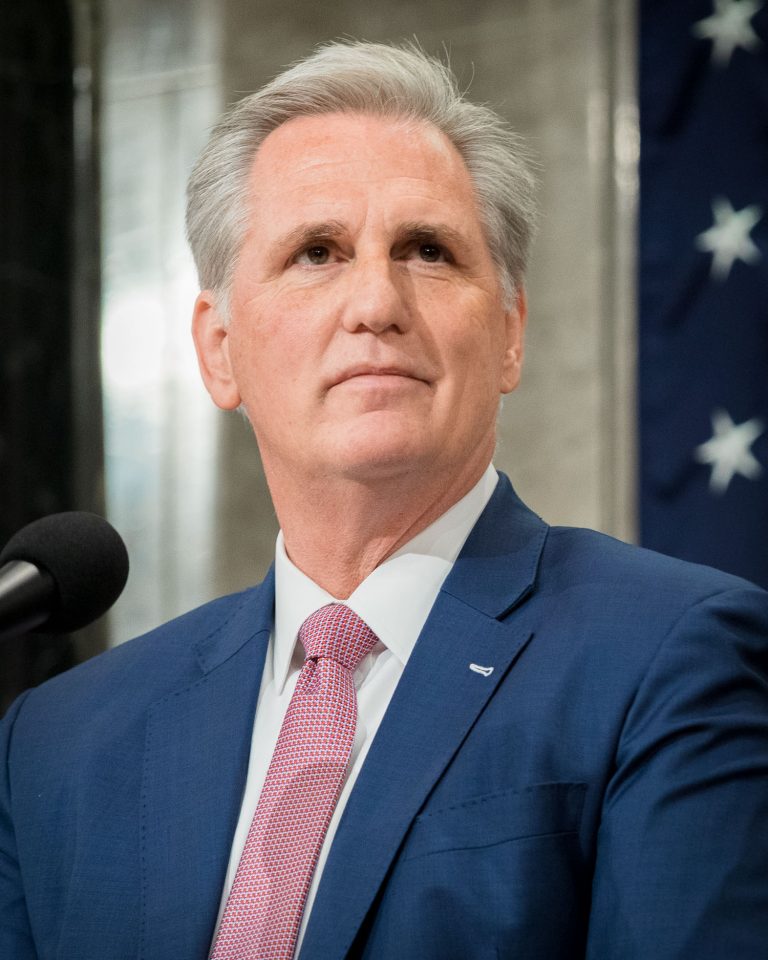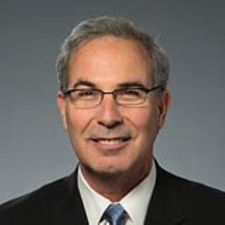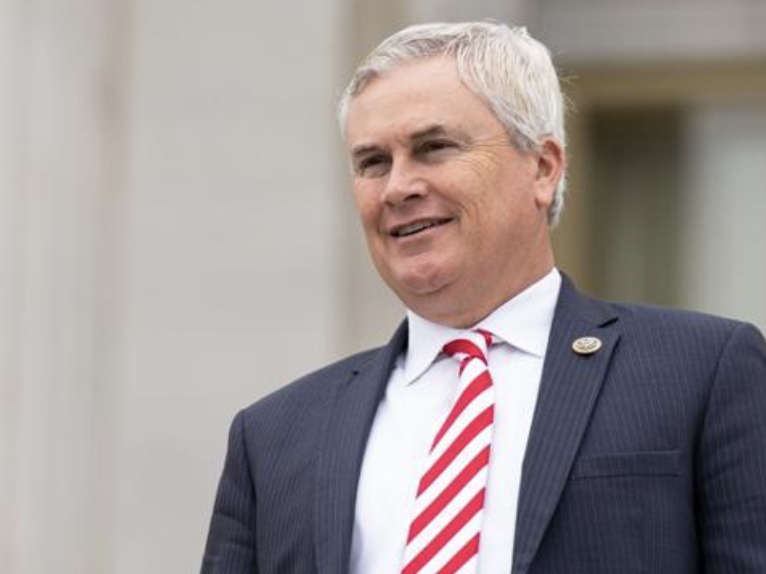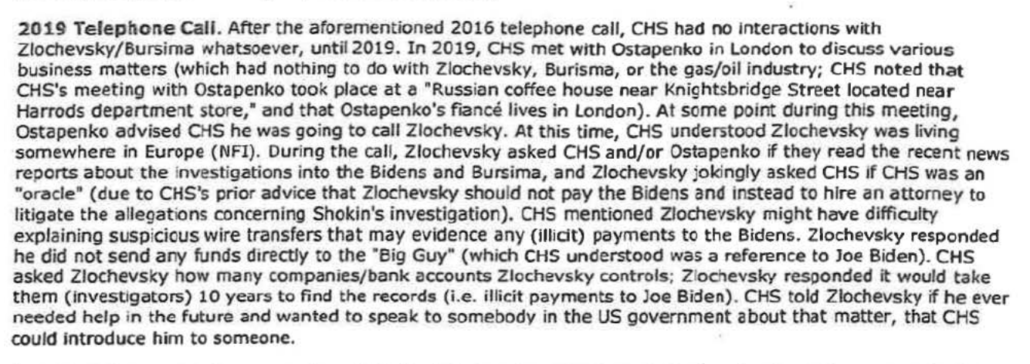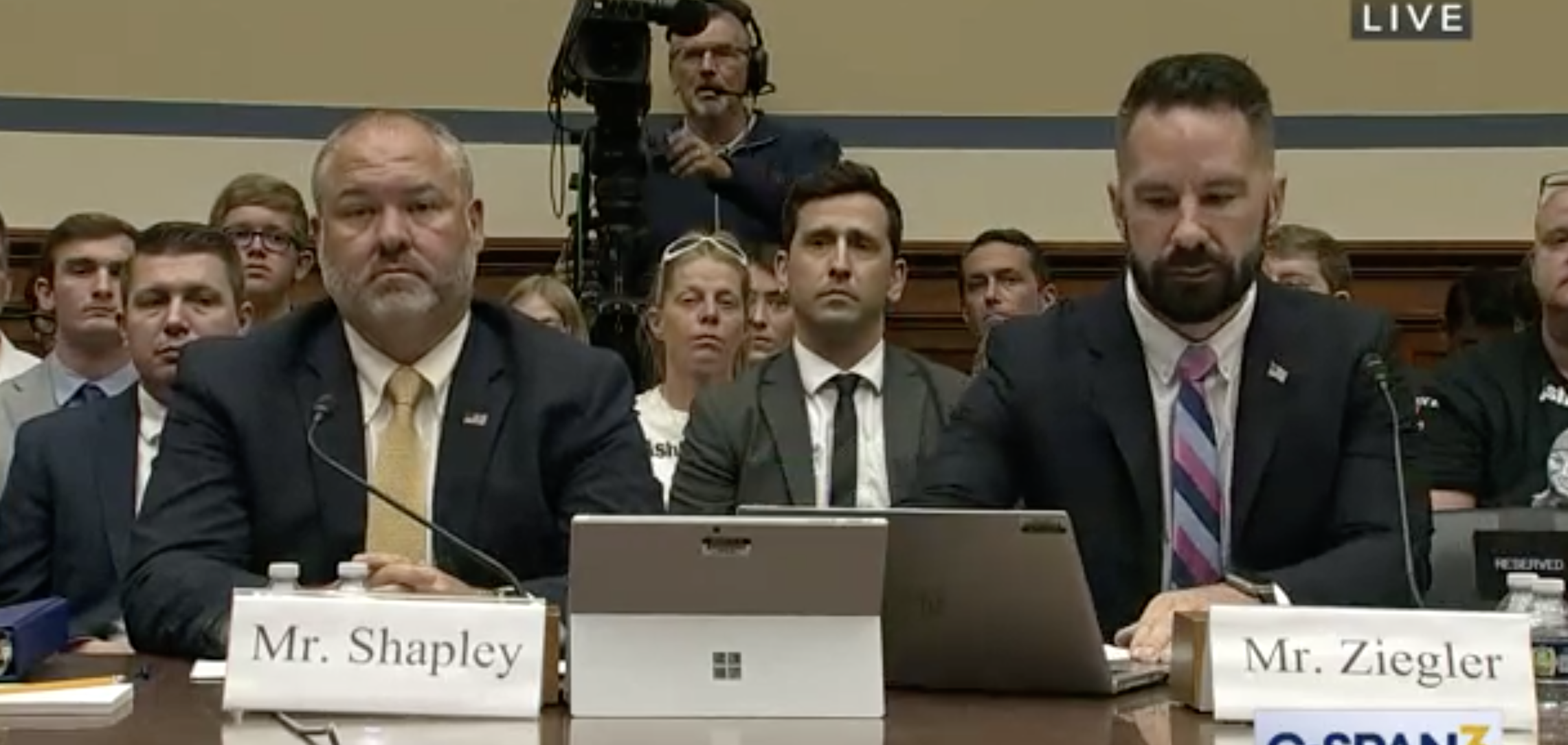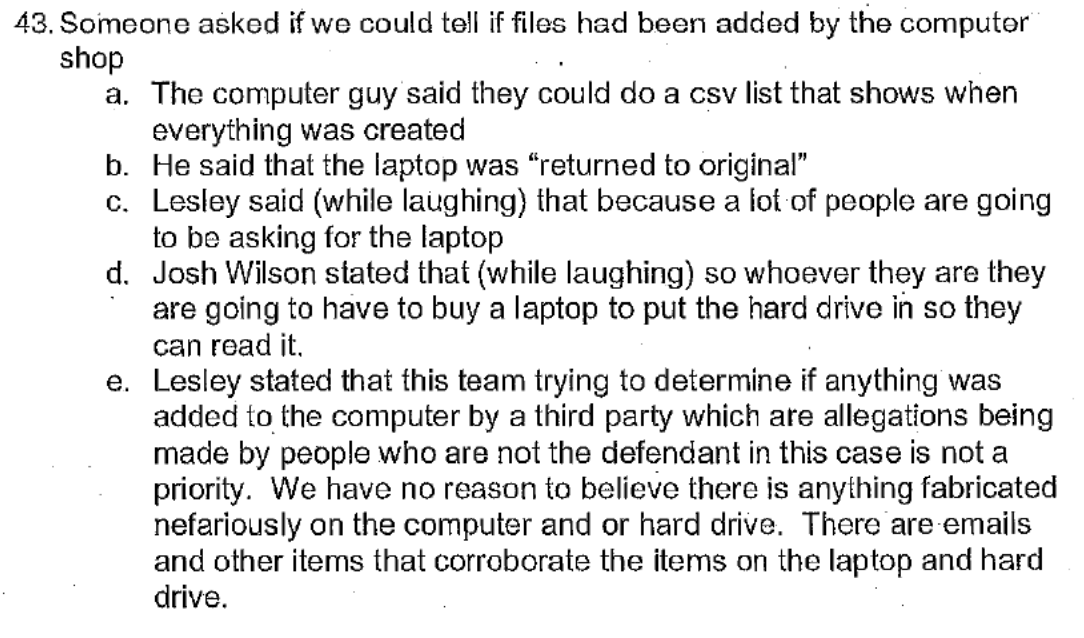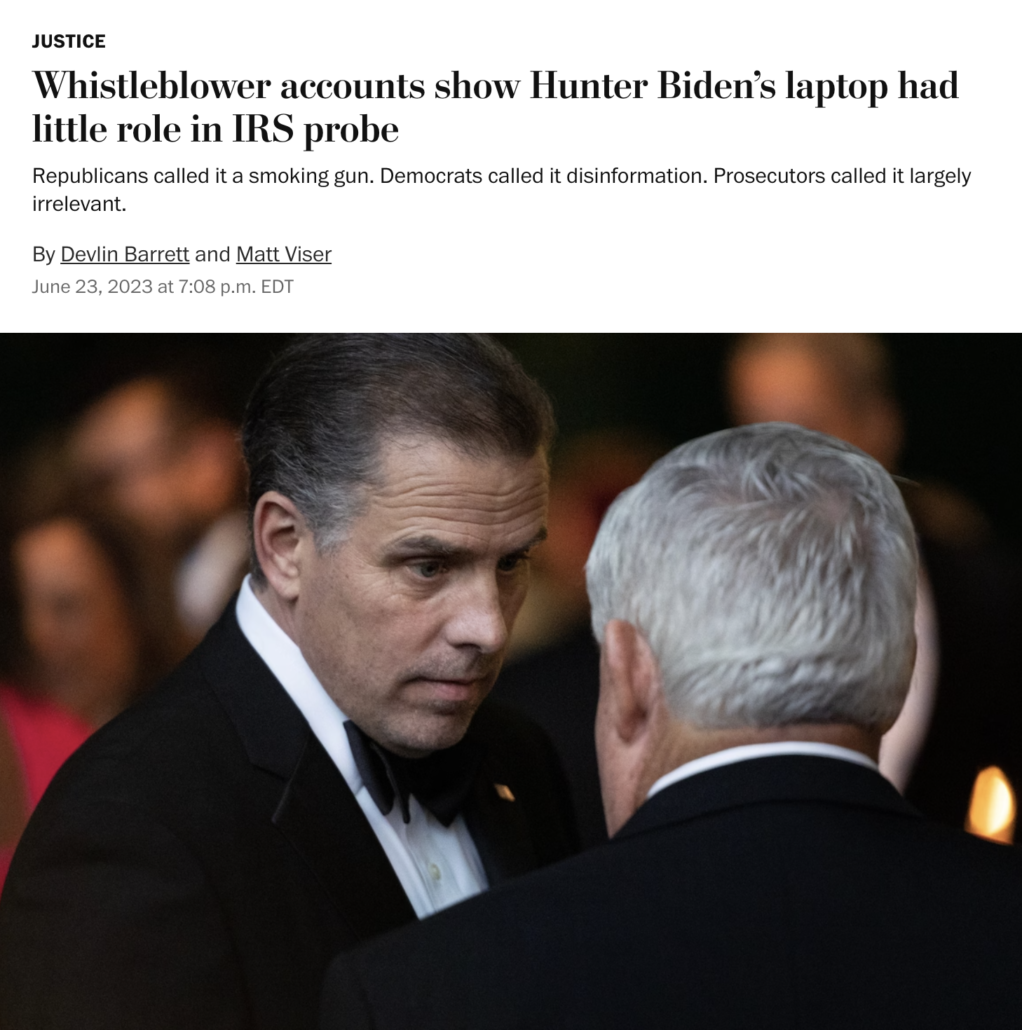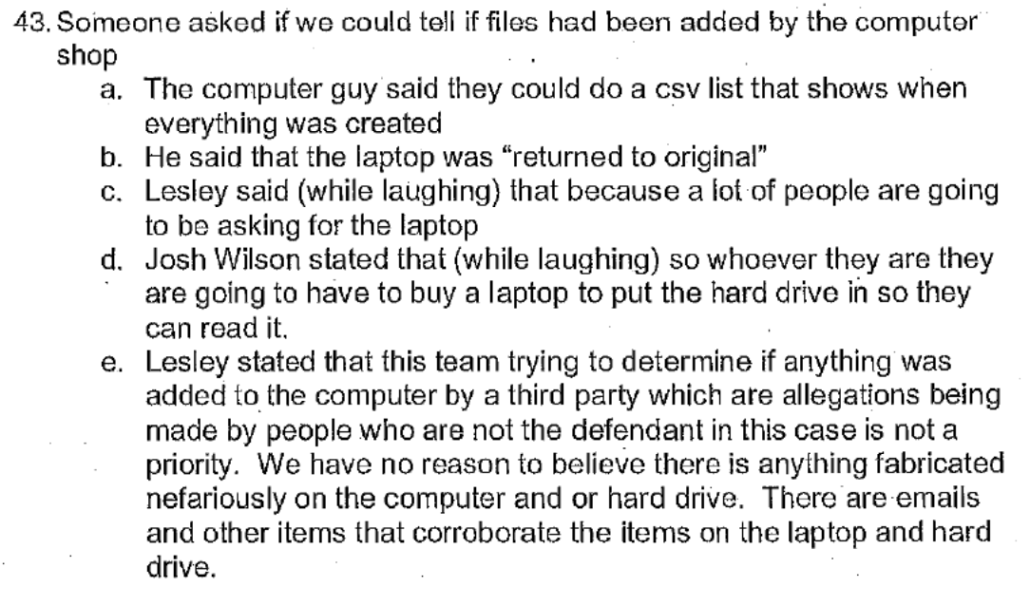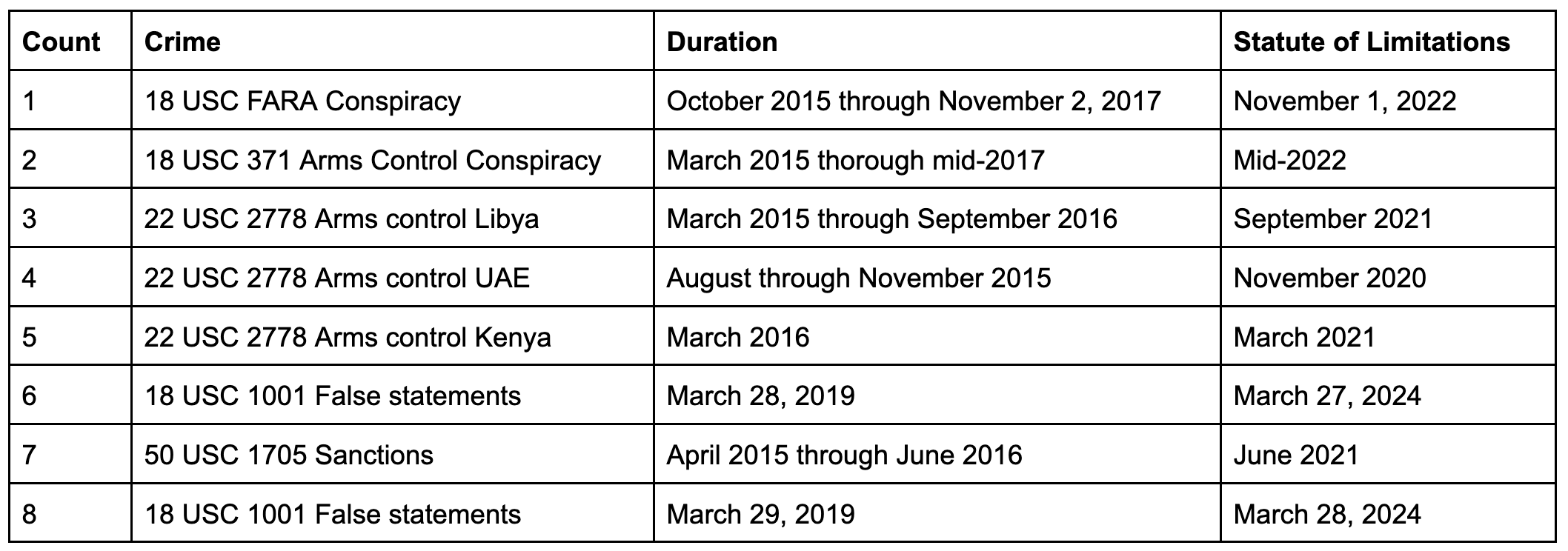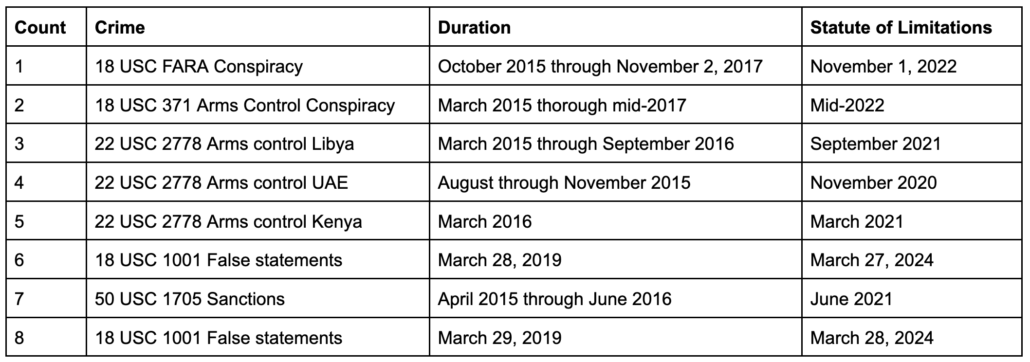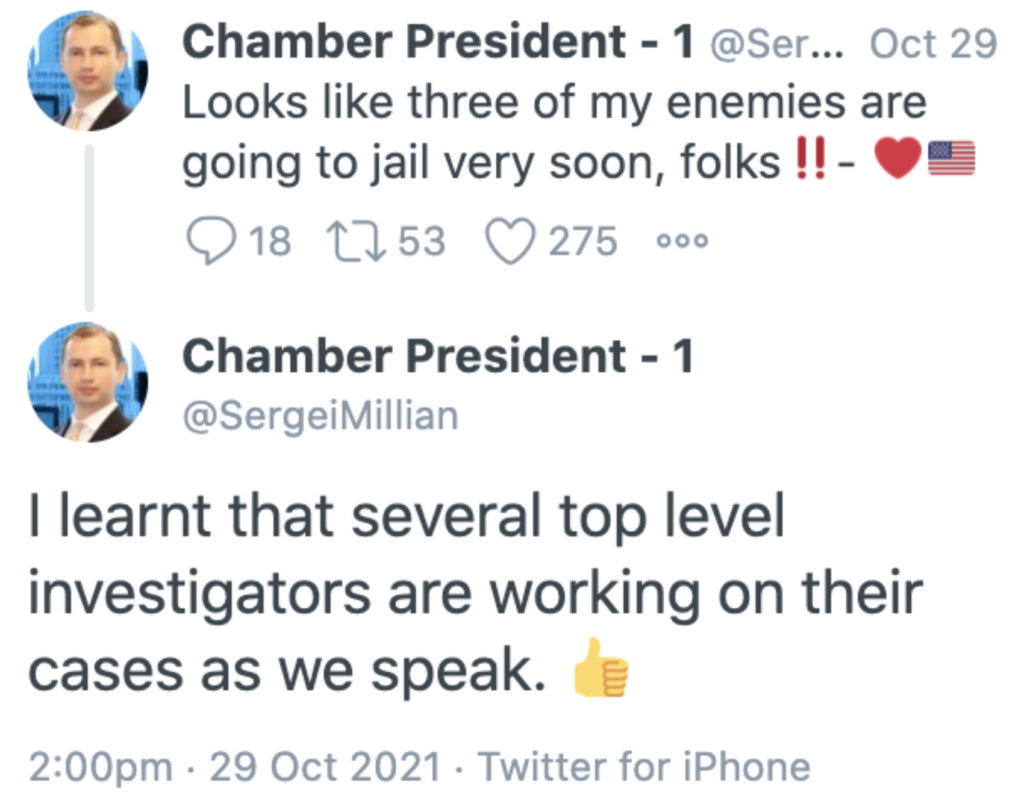In the hearing platforming the complaints of two IRS agents who are angry their case against Hunter Biden wasn’t charged as a felony, Joseph Ziegler — who had previously made a big deal of hiding his identity — was given an opportunity to deny being a source for public reporting on the Hunter Biden investigation.
In the exchange, Ziegler only denied being the source for Garrett Ziegler’s site — he was not asked, and he never denied, being a source for other media outlets.
Tim Burchett: It’s also come to my attention that today, after this hearing was already under way, apparently oppo research is circulating from, quote, Hunter Biden’s legal team, unquote, suggestions that you had leaked SARs and other investigative information to someone that had released that information online. Is there a statement that you’d like to make about whether you’ve leaked any investigative information to someone to reveal on the Internet? And I’m sure Hunter Biden’s legal team, who’s obviously watching right now, and these dirt bags are trying to smear you through the press. And it’s disgusting. And I’d appreciate hearing a direct answer from you, Brother.
Ziegler: So there’s two parts to this. There was that release of that bank report, my name was listed in there. So my name was out in the public as one of the IRS agents working this case. And that was maybe two or three years ago. So that came out. And then on top of that, me and my husband were in a report that’s out on social media, on Twitter, by a person with the same last name that I have who I’ve never met, I’ve never turned over information to, we just happen to have the same last name. Okay? I was, for my sexuality, my sexual orientation, my husband was put out there, like information related to me, so it was in an effort to discredit me that I’m this person working for the liberal side and I must, must be a plant. And it was awful the things that they were saying about me. But I can tell you that I’ve never turned over any information regarding this case to anyone related to that Marco Polo report or, someone with the same last name that I have.
It was not, at all, a denial that he was the source for other leaks to the press. It was a very limited denial, limited only to Garrett Ziegler, not generally.
He has made at least one other denial of leaking, which I’ll return to.
For now, I’m interested in the way that his claim, given under cloak of anonymity, that he and his spouse were harassed because his name showed up in the SARs and other legal process at Garrett Ziegler’s site is one reason he gave in his Ways and Means testimony for harping on his sexual orientation — about which of course, no Democrat would give a shit.
I’m an American, and my allegiances are to my country and my government. I’m also a gay man. I have a husband, two dogs, a home, and a life full of family and friends. But above all else, I’m a human being. My sexuality doesn’t define me as a person. It’s just who I love.
I’d like to say one more thing regarding this topic of sexuality, especially since it’s the start of Pride Month. But people have said that I’m gay and people have said, because I’m gay and that I am working as the case agent on this investigation, that I must be a far-left liberal, perfectly placed to fit some agenda. This was stuff that was on social media regarding me.
I can tell you that I am none of those things. I’m a career government employee, and I have always strived to not let politics enter my frame of mind when working cases.
I’ve tried to stay so nonpolitical that in the last Presidential election I voted but had decided to not vote for the Presidential candidate because I didn’t want to be asked that question in a court proceeding in the future and I didn’t want to show any potential bias. [my emphasis]
His sexual orientation is relevant to his testimony to the extent that right wingers harassed him after his name was made public by Garrett Ziegler.
In his opening statement this week, he used his sexual orientation again:
I had recently heard an elected official say that I must be more credible because I am a gay Democrat married to a man.
He can’t be accused of lying because he’s a gay man, he parroted others — who again, must be right wingers — as saying. He couldn’t have an association with efforts to leak the contents of a laptop that started getting packaged up the very same month he himself opened an investigation into a relatively small international tax cheat based off payments to Russian sex workers, his very first investigation in the group, because he would be harassed by associates of someone like Garrett Ziegler for who he is. In both cases, he used his sexual orientation as some measure of credibility, one that would never be convincing for actual Democrats, because Democrats just don’t give a shit (and know well that prominent gay men like Ric Grenell are truly epic right wing trolls). But Ziegler wielded his harassment by presumed frothers as if it ensures he’d never associate with people whose readers would harass a gay man.
Meanwhile, at Wednesday’s hearing, Gary Shapley was asked about leaks several times. In one exchange, Ro Khanna attempted, with limited success, to ask him a series of questions. In Shapley’s first answer, he claimed that he was the one who reported the October 6 to “our Inspector General,” so presumably Treasury’s Inspector General, TIGTA.
Ro Khanna: Let me just ask you on the media. You’ve given testimony under oath that you have never spoken to the Washington Post — any reporter on this matter, correct?
Gary Shapley: That’s correct.
Khanna: Do you know — have you spoken to any media outlet on this matter?
Shapley: Uh, I have spoken, after the House Ways and Means Committee,
Khanna: Before that, have you spoken to any media — journalists on this matter?
Shapley: Absolutely not.
Khanna: Do you know if any colleague of yours at the IRS has spoken to any journalist on this matter?
Shapley: Absolutely not.
Khanna: Do you know of any investigation into the leaks on this matter?
Shapley: Uh, … so the October 6 leak, I was the person who referred it to our Inspector General.
It’s an interesting claim because his own exhibit shows the FBI agent, Darrell Waldon, responding to Shapley’s email, which Shapley sent after 6PM on Friday October 7, before 8AM on the Tuesday after a Federal holiday, saying that he, Waldon, would take care of that referral.
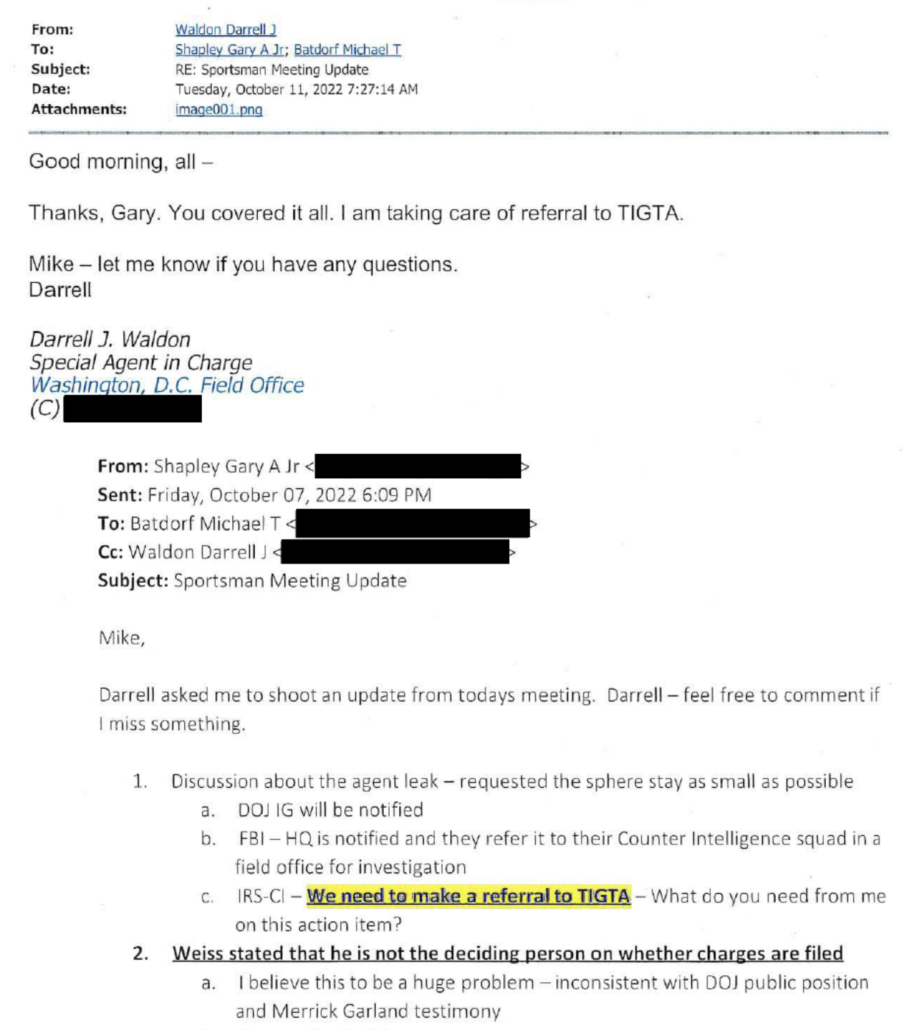
It may be that Shapley did make a referral, either via email over the weekend or after receiving an email saying someone else was taking care of it. It may also be that Shapley made his own referral even after Waldon did, which sure might raise questions at TIGTA. But Shapley’s own document raises questions about this claim.
As Khanna attempted to question Shapley further, Shapley kept talking over him, reciting an obviously rehearsed response. James Comer even tried to force Khanna to relinquish his time so Shapley could answer the question Shapley wanted to answer before Comer realized that’s not how it works.
Khanna: Do you know if any of your colleagues are under investigation —
Shapley: There was a leak on December 9, 2020, around the day of action. And I know the IRS Inspector General and DOJ IG are looking into…
Khanna: Do you know if any of your colleagues are under investigation? Sorry, if I could just finish. Do you know if any of your colleagues are under investigation for that leak?
Shapley: I know of no colleague under investigation for that leak [glances towards the Chair].
Khanna: And just for the record, it is your testimony under oath that you have never spoken to any media person before the House testimony about this matter?
Shapley: It’s not only my testimony under oath today, I’ve provided an affidavit to the House Ways and Means Committee saying the same. I’ve said it to our Inspector General’s office as well. [Crosstalk]
Khanna: I appreciate that. I just want to make a final point on this. One, I think that —
Shapley: Mr. Chairmain, you mind if I — [Shapley’s lawyers consulting behind him]
Comer: Can the Gentleman answer the question you asked, Mr. Khanna?
Khanna: I just don’t want my time to be–
Jamie Raskin: If you’re granting him the time, Mr. Chairman.
Khanna: I just want a minute to wrap up if you’ll give me time.
Comer: Okay, you have a minute.
Shapley was asked about leaks twice more, both times by Dan Goldman. In the first instance, Goldman asked how the October 6 leak came up in the October 7 meeting.
Goldman: You’re familiar with an October 6 Washington Post story entitled Federal agents see chargeable tax gun purchase case against Hunter Biden, is that right?
Shapley: Yes I’m familiar yes.
Goldman: And this was, this meeting occurred October 7, the day after this, right?
Shapley: That’s correct.
Goldman: Was this article discussed at that meeting?
Shapley: It was.
Goldman: And what was the nature of the discussion?
Shapley: Uh, it’s in that document, that email, that basically says we’ve got to keep the sphere small–
Goldman: So it’s pretty clear, you would agree, that this was a leak to the Washington Post by law enforcement agents since it describes what Federal agents believe, right?
Shapley: So it wasn’t actually clear to me that it was because usually they’ll say that it’s a law enforcement source that provided it, and if you see at the bottom it says they corroborated independently and they did not mention law enforcement. [Shapley’s attorney leans over to whisper to him]
Goldman: You don’t think it’s a Federal agent, agents, who leaked this when the headline says, Federal agents see chargeable tax gun purchase case against Hunter Biden?
Comer: Gentleman’s time is expired but feel free to answer the question.
Shapley was being questioned. But Ziegler piped in and offers up a December 9, 2020 leak.
Ziegler: So there, prior to that if you go back to December of 2020, there was another leak to the Washington Post that got, we had to get Department of Justice OIG involved, TIGTA involved so there was other leaks that happened prior to this to the Washington Post that I think, are important for us to understand as well.
Shapley: It has similar information as the October 6 leak.
It’s interesting that Ziegler piped in here, because answering a question about October 6 by raising the December 9, 2020 leak is what he did in his House Ways and Means testimony, too. Ziegler described that he told TIGTA that he believed a December 9, 2020 leak came from DOJ or (!!) the defense. He also described that “we would constantly be talking about” this subject.
Prior to this, there were other leaks. After our day of action in December of 2020, we got word that a couple of the news sources were going to release an article on the investigation. This was a couple days prior to us going public — going overt.
So that leak happened, and nothing changed after that one. And everything indicated, even in communication in meetings from what I recall — we thought that the leak was potentially from someone in [the] Department of Justice. So we would constantly be talking about, yeah, it’s not an IRS person. It’s not anyone on the team. It’s always — it appeared like it was someone from Department of Justice. So that’s what kind of shocked me with this moving forward.
I was interviewed by an investigator — I think they were with TIGTA. I told them, I didn’t leak anything. I thought that the leak might have come from either defense counsel, or from DOJ like the other ones came.
But back to Wednesday’s hearing. Goldman asked Shapley again about leaks in a later round.
Goldman: Gentlemen, I want to return to the Washington Post October 6 article and I’d ask unanimous consent to enter it into the record. In your testimony, Mr. Shapley, before the Ways and Means Committee, you stated, quote, there was a leak, it appeared to come from the agents level, who was critical of the prosecutors for not charging the case. What you testified earlier was a little different. Which one do you stand by today?
[pause]
Shapley: I’m sorry, could you repeat that?
Goldman, quoting: “There was a leak, it appeared to come from the agents level, who was critical of the prosecutors for not charging the case.”
Shapley: Yeah, I said it appeared, because I said it came from the agents’ level, but the source was a source familiar with the topic and it didn’t say it was a law enforcement source.
Goldman: Okay, that seems to be a distinction without a difference. And then, you understand that, obviously leaks of grand jury information is a felony, right?
Shapley: Leaking investigative information including 6103 would be a felony, yes.
Goldman: Well that’s true as well. So would you agree that there would be some skepticism from prosecutors about which of the agents may be the source of a leak?
Comer: Gentleman’s time is expired but feel free to answer the question.
Shapley: Since there have been multiple leaks in this investigation, and the one on December 8 or December 9, 2020, it appears to come from someone, as Lesley Wolf stated —
Goldman: I was just asking about October 6, 2022.
Shapley: So I
Goldman: It would cause anyone suspicion, right?
Shapley: If it says it comes from an agent level. [His attorney leans over, whispers something.]
Goldman: That’s what you said.
Comer: Gentleman’s time has expired.
Now, Goldman didn’t actually quote Shapley exactly. Here’s the full quote from Shapley’s Ways and Means testimony.
Q In No. 1 on this email you prepared, says: “Discussion about the agent leak — requested the sphere stay as small as possible…DOJ IG will be notified. FBI — HQ is notified.”
What was the specific leak?
A So there was a leak, I’m not sure what outlet, on October 6th of 2022 — it appeared to come from the agent’s level, who was critical of the prosecutors for not charging the case.
Q Okay. Talking about the Hunter Biden case?
A Yes, not charging the Hunter Biden case.
So, obviously that was part of the discussion at the beginning. And there have been multiple leaks in this case going back, and this one was handled a lot differently because I guess it was purportedly from the agent’s level.
So this drastic — you know, they used that as an excuse to kind of — to do what they were doing to us after this meeting on the 7th, they kind of used that leak as an excuse to exclude us.
In context, the view from others was that this was an agent level leak. Given his later use of the word, “purportedly,” I’m not sure it was Shapley’s espoused view.
I’m more interested in other aspects of this exchange.
In May, when Shapley answered a friendly question from the Majority Counsel, he feigned uncertainty what outlet this was from. In July, in public, Shapely kept answering questions about the October 2022 leak by responding about the December 2020 leak — and Ziegler explained they were doing so because “there was another leak to the Washington Post,” which by his telling they talked about all the time.
More interesting, though, is Shapley’s claim that, “this [leak] was handled a lot differently because I guess it was purportedly from the agent’s level.”
Both he and Ziegler described that this leak was the excuse to start excluding the IRS agents from the case.
But Shapley’s claim that the October 2022 leak was treated differently is likely false.
As I noted in this post, there was another leak, to the NYT in March 2022 (right after the IRS agents submitted their prosecution memo and asked DC to partner on it). That same month, for what Shapley presents as discovery purposes, everyone was asked for their email. But even though he had attempted to interview Hunter Biden himself in December 2020, he didn’t comply with that request.
It is common practice for DOJ to ask for the case agents’ communications in discovery, as they might have to testify in court. However, it’s much more unusual to ask for management communications, because it is simply not discoverable.
In March of 2022, DOJ requested of the IRS and FBI all management-level emails and documents on this case. I didn’t produce my emails, but I provided them with my sensitive case reports and memorandums that included contemporaneous documentation of DOJ’s continued unethical conduct. [my emphasis]
After the October meeting, prosecutors came back to Shapley, and asked again, which he got really touchy about.
[T]his was the culmination of an October 24th communication from Delaware U.S. Attorney’s Office and — well, it was really Lesley Wolf and Mark Daly who called the case agent, [redacted], on the telephone and said, hey, we need — we need Shapley’s emails and his — these sensitive case reports that he’s authored back to May.
And they didn’t ask for discovery for anybody else. They didn’t ask for, from the — mind you, the agents had provided discovery March-April timeframe, so there was 6 months or so of additional discovery, and they’re not asking for that, right? They’re only asking for mine.
So [redacted] sends me an email with Wolf and Daly on it that says, hey, you know, they asked for this, you got to talk to Shapley. I respond, hey, yeah, I’m available 9:15, let’s chat. And she sends that, she forwards my email to Shawn Weede, number [two] — a senior level at Delaware U.S. Attorney’s Office.
And then he contacts me about this discovery, and he’s kind of putting a lot of pressure on me. So even Weiss called up, the deputy chief, to complain about timing of the emails that got turned over from me at that request. [my emphasis]
It appears that it’s not that DOJ treated the leak differently, it’s that they noticed that the first time they asked for emails, he had blown off the request.
Again, as I noted here, as Darrell Waldon, the same agent who said he’d take care of the TIGTA referral, started reviewing his emails, Shapley asked for advance notice of anything suspicious — precisely the thing he said Hunter Biden should not get.
If you have questions about any emails I would ask you share it in advance so I can look at them and be prepared to put them into context. The USAO was so eager to got my emails (which they already had 95% of) … then surprise … they “might” have a problem with a few of them that memorialized their conduct. If the content of what I documented, in report or email is the cause of their consternation I would direct them to consider their actions instead of who documented them.
I have done nothing wrong. Instead of constant battles with the USAO/DOJ Tax, I chose to be politically savvy. I documented issues, that I would have normally addressed as they occurred, because of the USAO and DOJ Tax’s continued visceral reactions to any dissenting opinions or ideas. Every single day was a battle to do our job. I continually reported these issues up to IRS-CI leadership beginning in the summer of 2020. Now, because they realized I documented their conduct they separate me out, cease all communication and are not attempting to salvage their own conduct by attacking mind. This is an attempt by the USAO to tarnish my good standing and position within IRS-CI … and I expect IRS-CI leadership to understand that. As recent as the October 7 meeting, the Delaware USAO had nothing but good things to say about me/us. Then they finally read “discovery” items (provided 6 months previous — that are not discoverable) and they are beginning to defend their own unethical actions.
Consider the below:
- I am not a witness — therefor Jencks/impeachment is not an issue.
- I am not the receiver of original evidence nor engaged i any negative exculpatory language against the subject … My documentation only shows the USAO/DOJ Tax’s preferential treatment of this subject. [bold underline original, italics mine]
Shapley’s boss, Michael Batdorf, was, at that point, quite supportive of the possibility that Shapley would have concerns about prosecutorial misconduct. Two months later he began to put a hold on what Shapley and others were doing.
I don’t think any of this shows that these IRS agents were leakers one way or another, and I also think it likely that whoever did some of these leaks used a cut-out.
Shapley may not be the leaker. But he sure seems to be hiding stuff in his emails. And only after his emails got turned over did he start claiming to be a whistleblower.

